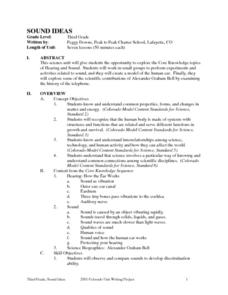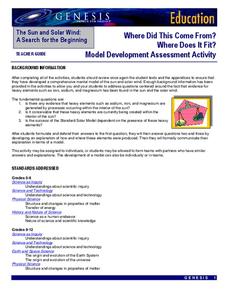Curated OER
Earth's Water
If the majority of our planet is covered with water, why do we need to bother conserving it? With a thorough and varied investigation into the location and types of water on the earth, learners will gain an understanding of why this...
National Institute of Open Schooling
Radioactive Pollution
Radioactive pollutants can enter the body through ingestion, inhalation, absorption, or injection. The last lesson in a series of 36 introduces pupils to radioactive pollution. They study its sources, both natural and man-made, its...
Curated OER
Photocells II: The Photoelectric Effect in Photocells
It's not easy to find fabulous physics lesson plans, but School Power Naturally has put together a series of them. In this particular lesson, high schoolers learn about the structure and functioning of photovoltaic cells. They construct...
Curated OER
Make a Solar Sill
Students design a solar still and purify water. In this earth process and design activity, students observe how the heat of the sun helps to purify water. Students analyze why this could be helpful on a desert island. ...
Science Geek
Ionic Bonding
Here's a presentation that answers the age-old question of the covalent bond to the ionic bond, "Why won't you share?" Included is information about covalent and ionic bonds, the octet rule, ionic compounds, cations versus anions, and...
PHET
Planet Designer: Kelvin Climb
It's time to get those creative juices flowing! This second lesson plan in a series of five continues allowing pupils to design their own planets. It the same format as the first, but, this time, allows students to alter greenhouse...
Laboratory for Atmospheric and Space Physics
A Classroom Solar System
Create a scaled model of our solar system in your classroom! Scholars work collaboratively to build paper mache planets and hang them in their proper position to showcase each planet's location in the solar system.
Science Matters
Earthquakes and Volcanoes Post Assessment
The final lesson in the 20-part series is a post assessment covering earthquakes and volcanoes. Twenty-three questions incorporate each of the previous lessons through multiple choice, justified multiple choice, expanded multiple choice,...
Curated OER
Raven Chapter 10 Guided Notes: Photosynthesis
Kim B. Foglia has designed a comprehensive series of AP biology worksheets. This one focuses learners on the progression of photosynthesis in plants. In this assignment, they identify structures and steps on high-quality diagrams, use...
Curated OER
Pond Ecology
A lab activity is a great way to incite thoughtful questioning and scientific processes. Pupils will collect organisms with a Petri dish, make observations, sketch the organism, ask questions, then attempt to identify the specimen...
Curated OER
Earthquakes: Fifth Grade Lesson Plans and Activities
After learning about P waves and S waves, fifth graders view the intensity of earthquakes by examining seismographs and images of earthquake damage. Young scientists then forecasting future quakes by analyzing data about...
It's About Time
AC and DC Currents
An informative physics lesson includes two teacher demonstrations, one on AC currents and the other on DC currents, allowing pupils to take notes while watching. The resource includes questions to assign as homework or...
Columbus City Schools
Photosynthesis and Respiration
Thirty percent of the world's oxygen is produced by rainforests found throughout the world. Seventh grade learners explore the processes of photosynthesis and respiration through 10 days of labs, manipulatives, and discussions. They...
American Chemical Society
Represent Bonding with Lewis Dot Diagrams
Lewis dot diagrams, Lewis dot structures, and electron dot diagrams are all the same thing. Young scientists learn how to draw Lewis dot diagrams and come to understand how dots and dashes represent valence electrons and ionic or...
Curated OER
Earthquakes: Kindergarten Lesson Plans and Activities
Beginning with a pre-lab, kindergarteners trace the letters in the word earthquake and discuss what happens in an earthquake. The lab portion allows young scientists realize that earthquakes trigger shaking of different intensities...
Cornell University
Unknown Powders
Create a little scientific magic within your classroom! Learners mix powders and liquids and identify chemical reactions. Based on the reactions, individuals determine the identity of various powders.
Curated OER
Scale Model of the Solar System
Young scientists gain a better understanding of space, the solar system and its vastness by creating a scale model. Students first need to calculate the distance between each of the nine planets according to the size of their scale. This...
Science Geek
Reaction Types
This is one way to get a reaction from your classes! The lesson presents the different reaction types with an explanation, chemical equation model, and examples. The slides include decomposition, single replacement, double replacement,...
Curated OER
Sound Ideas
Complete a unit of lessons on hearing and sound. Learners conduct sound experiments, research the history of the telephone and scientific contributions of Alexander Graham Bell, and create a model of the human ear.
Curated OER
Polymers and Products from Petroleum
Over four sessions, learners survey the production and use of polymers and petroleum products. First, they participate in a kinesthetic activity to demonstrate how polymers act, and review a list of common products made from...
Science Geek
Metallic Bonding
Introduce your class to metallic bonding with a presentation that covers packing in metals, substitutional alloys, interstitial alloys, and properties of metals.
NASA
Model Development Assessment Activity
Time to show off what they've learned! The final instructional activity in the series of six asks young scholars to process their learning from the previous lessons. They identify possible elements of the sun as well as a possible origin.
Pingry School
Kinetics of the Acid Decomposition of Thiosulfate
Several factors affect the rate of a chemical reaction including temperature, surface area, and concentration. Using an experimental approach, learners explore the effect concentration has on this rate while maintaining consistency with...
Curated OER
Summary of Organic Reaction Mechanisms Needed for AS Chemistry
Advanced chemistry courses typically cover organic reactions. On this reference sheet, the five types of organic reaction mechanisms are explained and an example is shown. For each, there is also a diagram of the chemical reaction...

























